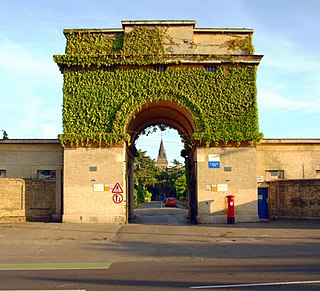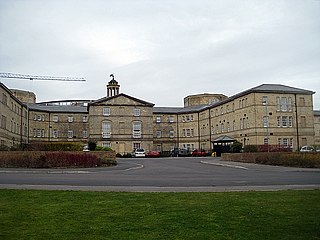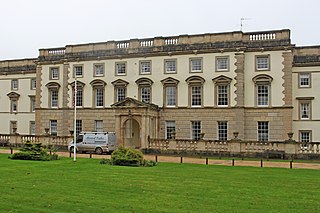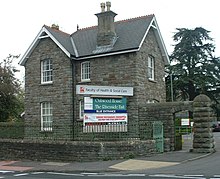
The University of the West of England is a public research university, located in and around Bristol, England, UK. With more than 39,912 students and 4,300 staff, it is the largest provider of higher education in the South West of England.
Glenside is a suburb in the local government area known as the City of Burnside, Adelaide, South Australia. The suburb is 4.9 kilometres south-east of the Adelaide city centre, home to 2,422 people in a total land area of 1.40 km2.
Brentry is a suburb of north Bristol, England, between Henbury and Southmead which is spread along the southern edge of the Filton to Avonmouth railway line.

St Bernard's Hospital, also known as Hanwell Insane Asylum and the Hanwell Pauper and Lunatic Asylum, was an asylum built for the pauper insane, opening as the First Middlesex County Asylum in 1831. Some of the original buildings are now part of the headquarters for the West London Mental Health NHS Trust (WLMHT).

Glenside Museum is situated within the Glenside Campus of the University of the West of England in Fishponds, Bristol, England.

The Trans-Allegheny Lunatic Asylum was a psychiatric hospital located in Weston, West Virginia and known by other names such as West Virginia Hospital for the Insane and Weston State Hospital. The asylum was open to patients from October 1864 until May 1994. After its closure, patients were transitioned to the new William R. Sharpe, Jr. Hospital in Weston, named after William R. Sharpe Jr., a member of the West Virginia Senate. The hospital reopened as a tourist location in March 2008.

Knowle Hospital, was a psychiatric hospital that was repurposed as the village of Knowle near the town of Fareham in Hampshire, southern England, which opened in 1852 and closed in 1996.

Kew Lunatic Asylum is a decommissioned heritage-listed psychiatric hospital located between Princess Street and Yarra Boulevard in Kew, a suburb of Melbourne, Australia. Operational from 1871 to 1988, Kew Asylum was one of the largest asylums ever built in Australia. Later known as Willsmere, the complex of buildings were constructed between 1864 and 1872 to the design of architects G.W. Vivian and Frederick Kawerau of the Victorian Public Works Office to house the growing number of "lunatics", "inebriates", and "idiots" in the Colony of Victoria.

The Stanley Royd Hospital, earlier named the West Riding Pauper Lunatic Asylum, was a mental health facility in Wakefield, West Yorkshire. It was managed by the Wakefield and Pontefract Community Health NHS Trust.

Springfield University Hospital is a psychiatric hospital in Tooting, South London and also the headquarters of the South West London and St George's Mental Health NHS Trust.

Beaufort War Hospital was a military hospital in Stapleton district, now Greater Fishponds, of Bristol during the First World War. Before the war, it was an asylum called the Bristol Lunatic Asylum, and after the war it became the psychiatric hospital called Glenside Hospital.

Knowle is a village with mainly 21st century shops and businesses in the civil parish of Wickham and Knowle, in the Winchester district of Hampshire, England that sits high on the left bank of the Meon between the Southampton and Portsmouth conurbations. It is in the south of the parish of Wickham and Knowle in which it ranks in population about 25% behind Wickham. Its nearest town is Fareham, adjoining an inlet of Portsmouth Harbour approximately 3 miles (4.8 km) south-east.

The Dower House, Stoke Park is a dower house in Bristol, England. It is one of Bristol's more prominent landmarks, set on Purdown, a hill above the M32 motorway on the main approach into the city, and painted yellow.

Blackberry Hill Hospital is an NHS psychiatric hospital in Fishponds, Bristol, England, specialising in forensic mental health services, operated by the Avon and Wiltshire Mental Health Partnership NHS Trust. The hospital also offers drug and alcohol rehabilitation inpatient services, and is the base for a number of community mental health teams.
Healthcare in the city of Bristol, England and the surrounding area is largely provided by the National Health Service (NHS). Until July 2022, this was provided through the Bristol, North Somerset and South Gloucestershire clinical commissioning group. Facilities include a large teaching hospital – Bristol Royal Infirmary – which offers nationally commissioned specialist cardiac, cancer and children's services from its city-centre campus to patients in the southwest of England and beyond.

Stoke Park Hospital, was a large hospital for the mental handicapped, closed circa 1997, situated on the north-east edge of Bristol, England, just within South Gloucestershire. Most patients were long-term residents, both adults and children of all ages. A school was on-site. Prior to 1950, it was known as the Stoke Park Colony, which was founded in 1909.

Brislington House was built as a private lunatic asylum. When it opened in 1806 it was one of the first purpose-built asylums in England. It is situated on the Bath Road in Brislington, Bristol, although parts of the grounds cross the city boundary into the parish of Keynsham in Bath and North East Somerset.

Lancaster Moor Hospital, formerly the Lancaster County Lunatic Asylum and Lancaster County Mental Hospital, was a mental hospital in Lancaster, Lancashire, England, which closed in 2000.
Glenside Hospital, as it was known from 1967, previously the Public Colonial Lunatic Asylum of South Australia, Parkside Lunatic Asylum and Parkside Mental Hospital, was a complex of buildings used as a psychiatric hospital in Glenside, South Australia. Since the 1970s the original site has been subdivided and parcels of land sold off, largely for housing. The large administration building fronting the side was refurbished to house the Adelaide Studios of the South Australian Film Corporation in 2011, and the old P&O Ward now houses Adelaide Central School of Art. The site is sometimes referred to as "the old Glenside Hospital", the "Glenside Hospital historical precinct" or "Glenside Campus". A new building houses Glenside Health Services at the southern end of the site, along with new wards and facilities.

The Royal Dundee Liff Hospital, previously known as Dundee Lunatic Asylum and Dundee Royal Lunatic Asylum, was a mental health facility originally established in 1812 in Dundee, Scotland. It was originally located in premises in Albert Street Dundee, but later moved out of the town to new buildings in the nearby parish of Liff and Benvie. Buildings at Liff included Greystanes House, which was the main building, and, Gowrie House, which was the private patients' facility. Both Grade B listed buildings.




















